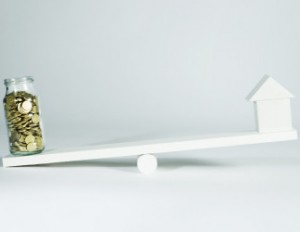When to make the leap from renting to buying
Here's what you'll need before you make the jump from renter to home owner.
Advertisement
Here's what you'll need before you make the jump from renter to home owner.
 One of the things I hear most often is that people want to buy their own homes because renting is just flushing money down the toilet. Hey, if you have the “will” to move from renter to home-owner, that’s the first step. The second step: having the “means.”
Wanting to own isn’t just about the money; perhaps you want to know you can stay where you are with no fear you’ll be told to move just when you’ve got the place perfect. Or perhaps you’re looking for a neighbourhood with good schools and a strong community and there aren’t a lot of rental options. But buying a home is a big decision, and without some careful planning, it can end in disaster. Here are some things you must be sure you have in place before you make the leap from renter to owner.
Enough income: Seems obvious right? Yet loads of people move into their first home and then discover that their latest acquisition is eating so much of their money they have to use credit to cover the gap. Lenders will want to see a solid work history—minimum 1 year at your latest job—so if you’ve been quilting together an income, you may have difficulty being approved for a mortgage.
A downpayment: Again, obvious? Except that there are still people offering new buyers ways to get into homes without any money down. Whether it’s through a cash-back program, or through alternative lenders, it’s a bad idea. Don’t think that the bare minimum of 5% down means you’re ready. Having less than 20% down means that on a $375,000 home you’ll have to fork over nearly $10,000 in mortgage insurance premium, and pay more than $55,000 in interest in the first five years, assuming a mortgage of just 3.25%. That means you’ll be paying about $917 a month in interest. Pretty comparable to rent, don’t you think?
No consumer debt: Having no consumer debt means you’re in a better place to qualify for a mortgage. Having no consumer debt also means you’ve got your spending in line with your income so you’re less likely to hit the wall once you close and start paying all those new bills. If you carry consumer debt into the home-purchase phase of your life, it’s because you think you can have it all at the same time. You can’t. You’ll see.
One of the things I hear most often is that people want to buy their own homes because renting is just flushing money down the toilet. Hey, if you have the “will” to move from renter to home-owner, that’s the first step. The second step: having the “means.”
Wanting to own isn’t just about the money; perhaps you want to know you can stay where you are with no fear you’ll be told to move just when you’ve got the place perfect. Or perhaps you’re looking for a neighbourhood with good schools and a strong community and there aren’t a lot of rental options. But buying a home is a big decision, and without some careful planning, it can end in disaster. Here are some things you must be sure you have in place before you make the leap from renter to owner.
Enough income: Seems obvious right? Yet loads of people move into their first home and then discover that their latest acquisition is eating so much of their money they have to use credit to cover the gap. Lenders will want to see a solid work history—minimum 1 year at your latest job—so if you’ve been quilting together an income, you may have difficulty being approved for a mortgage.
A downpayment: Again, obvious? Except that there are still people offering new buyers ways to get into homes without any money down. Whether it’s through a cash-back program, or through alternative lenders, it’s a bad idea. Don’t think that the bare minimum of 5% down means you’re ready. Having less than 20% down means that on a $375,000 home you’ll have to fork over nearly $10,000 in mortgage insurance premium, and pay more than $55,000 in interest in the first five years, assuming a mortgage of just 3.25%. That means you’ll be paying about $917 a month in interest. Pretty comparable to rent, don’t you think?
No consumer debt: Having no consumer debt means you’re in a better place to qualify for a mortgage. Having no consumer debt also means you’ve got your spending in line with your income so you’re less likely to hit the wall once you close and start paying all those new bills. If you carry consumer debt into the home-purchase phase of your life, it’s because you think you can have it all at the same time. You can’t. You’ll see.
Share this article Share on Facebook Share on Twitter Share on Linkedin Share on Reddit Share on Email